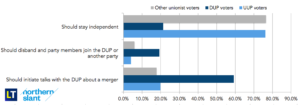Given the UUP’s conveyor-belt of flirtations with other parties over the last decade – from the Conservatives in 2010 to the DUP, the SDLP in ‘official opposition’ at Stormont, then back to DUP – it should come as no surprise to find that the party faithful is out of joint.
According to LucidTalk’s latest poll results published this week, 20% of respondents who described themselves as UUP supporters and voters think the party should look to the DUP to forge a single unionist party.
In this latest ‘Tracker’ poll, conducted between 21 and 23 June, LucidTalk targeted its 8,827 member Panel; 2,883 responses were received.

“We note you said you voted/supported [insert party] in the recent elections (and/or support this party now). Taking into account the poor UUP election results, the recent resignation of former UUP chairman David Campbell, what do you think is the best plan for the UUP (and minor unionist parties) in the future?” 2,080 responses (weighted); displaying results by voters of different unionist parties. ‘Other unionist voters’ are supporters of the TUV, PUP, UKIP and NI Conservatives.
But Northern Ireland has moved on, most accept that multi-party government is the only way forward. Has the UUP changed with the times, too? If we think back to March’s Assembly election campaign, the answer is “not really”.
When now former party leader Mike Nesbitt said he would give his second preference to the SDLP – their partners in opposition – the blacklash he faced from some of his own MLAs and grassroots made it clear that the party still isn’t at one with the idea of sharing with nationalists. Opposition, it seemed, was the last stick to beat the DUP with.
LucidTalk’s findings don’t suggest that the party’s collapse is imminent, but its position is precarious. For a long time unionist unity has seemed a real option; with the wipeout of the UUP’s two MPs at this month’s general election, it looks almost certain.
Yet, whilst the party is running out of road, if current followers decide to go their own way they could ironically have a greater influence on Northern Ireland’s political landscape than they have had for a long time.
They can choose either to join forces with the DUP, and back unionism into one last corner, or branch out to join more somewhat progressive parties that do not consider themselves capital ‘U’ unionists or nationalist for that matter.
Cooperation with the SDLP could have been more fruitful had the two parties had longer in opposition; alas it was the fallout between the ‘big two’ that eclipsed them after 1998 – the DUP and Sinn Féin – that brought Stormont down.
Reports have it that the SDLP may now look to a merger with Fianna Fáil. As unionist unity comes creeping around the corner, maybe those with a small ‘U’ in unionist may seek to rebuild a fragile centre ground.
This week’s LucidTalk poll shows a clear majority of UUP voters are clear on what they don’t want: a merger with the DUP. A significant proportion appear open to persuasion. It will take a lot of imagination to work out what the party – and its existing members – do want, if the party is to survive.
Methodology, and more on LucidTalk
Polling was carried out by Belfast based polling and market research company LucidTalk. The project was carried out online for a period of 60 Hours from 11am 21st June to 11pm 23rd June 2017 (60 Hours). The project targeted the established Northern Ireland (NI) LucidTalk online Opinion Panel (8,827 members) which is balanced by gender, age-group, area of residence, and community background, in order to be demographically representative of Northern Ireland.
2,883 full responses were received, and a data auditing process was carried out to ensure all completed poll-surveys were genuine ‘one-person, one-vote’ responses, and also to collate a robust and accurate balanced NI representative sample. This resulted in 2,080 responses being considered in terms of the final results – the results presented in this report.
All data results have been weighted by gender and community background to reflect the demographic composition of Northern Ireland resulting in 2,080 responses being considered in terms of the final results. All data results produced are accurate to a margin of error of +/-3.0%, at 95% confidence.
LucidTalk is a member of all recognised professional Polling and Market Research organisations, including the UK Market Research Society (UK-MRS), the British Polling Council (BPC), and ESOMAR (European Society of Market Research organisations).
For more information, visit www.lucidtalk.co.uk and follow @LucidTalk on Twitter.
Also published on Medium.
